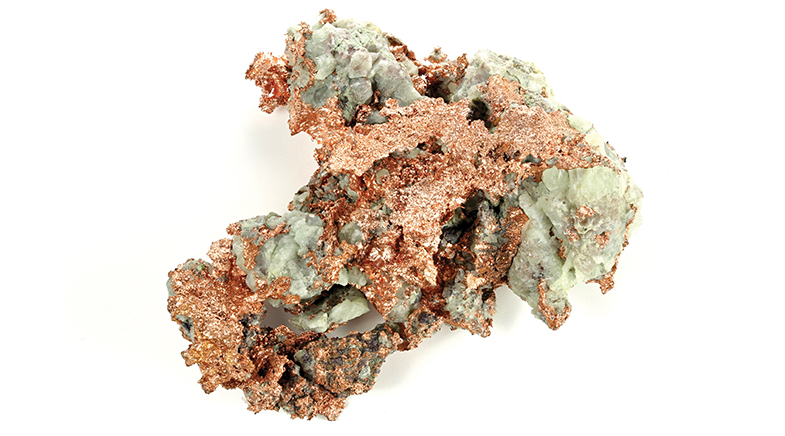Heart of the matter
-
- from Shaastra :: vol 03 issue 09 :: Oct 2024

Start-ups focus on improving indoor air, 3D metal printers for aerospace, and painless jabs with microneedles.
MedCuore Medical Solutions
Founders: Paul Pradeep J., Geetha Balasubramani and Britto Shibi
Year: 2020
Big idea: Addressing indoor air quality problems using data-driven solutions
Paul Pradeep J. was doing his PhD at the University of Milan when the COVID-19 pandemic forced him to return home to Chennai. He had been designing 3D-printed nano disposable films for personalised drug delivery in his doctorate programme. Once back in India, he continued working on the project. He also helped biomedical engineers fix respiratory care equipment, in great demand during the pandemic.
That was when Paul, who had done his Master's from Politecnico di Milano in Italy, realised the importance of monitoring and maintaining air quality. He formed a company called MedCuore Medical Solutions — cuore is Italian for heart — with his wife, Geetha Balasubramani, who did her Master's with Paul in Italy and is now pursuing her PhD in Biomaterials and Biomechanics in Chennai, and Britto Shibi, who had graduated in Mechatronics and was Paul's junior at SRM University.
When COVID-19 underlined the importance of indoor air quality, the founders began making equipment to monitor, maintain, and improve indoor air quality. The larger goal, he says, is to produce air quality sensors and employ people from smaller cities and towns.

According to Paul, MedCuore makes air purifiers with filters coated with organic nanoparticles. "We have developed a unique set of processes by which these nanoparticles are extracted with the help of only water. The shelf life of these nanoparticles is 24 months, much higher than (that of) acid- or chemicals-based technology," he says. MedCuore uses Internet of Things (IoT) systems based on artificial intelligence (AI) and machine learning for air quality monitoring. In indoor spaces, there are nearly 23 different types of pollutants in three categories: particulate matter, chemical pollutants, and biological pollutants. MedCuore has three versions of air quality monitoring devices. It can customise the monitoring capability from three parameters up to 23 parameters.
The air quality is monitored with AI/IoT-based hardware built in-house. The purification system can cover up to 1,500 square feet and purify, humidify, and sterilise the air. MedCuore extracts fragrances from different sources to enhance the quality of air. It has 11 fragrances through patented technology.
Located at the Crescent Innovation & Incubation Council near Chennai, MedCuore plans to ramp up its production and business capacity. It wants to appoint distribution partners to market the products and bring on board pollution control experts as advisers.
Carbine Systems
Founders: Girish Joshi and Kedar Joshi
Year: 2023
Big idea: Building deep learning-powered 3D metal printers for aerospace and other industries
Aerospace had captured Girish Joshi's imagination from an early age. As an engineering student, he took a keen interest in space propulsion. He was also eager to do something in his hometown, Belagavi in Karnataka, which, he says, has a good manufacturing ecosystem. After graduating, he got involved in 3D printing of parts for Belagavi-based companies.
That was also the time artificial intelligence (AI) and deep learning had begun to make an impact on manufacturing. Joshi says he did not look at AI as a replacement for humans but explored how it would best assist them. "When you are forming a mechanical part, the more skilled the worker is, the better the part is. We thought we would give this training to machines so that machines could help the user create better parts," he says. Joshi started working on this as he learnt about metal composites. With his brother Kedar, who has a Master's in Physics from the National Institute of Technology Karnataka, he set up Carbine Systems to develop and build metal 3D printers from scratch. Carbine was incubated at the Indian Institute of Technology Mandi, but shifted to Belagavi for more space and to be close to a manufacturing hub.

According to Joshi, the plan is to build the metal 3D printers, launch them commercially, and then attempt to build a propulsion system. Carbine began by making controllers for the printers and then built the other parts. Metal 3D printers are mostly imported, mainly from Germany and Japan, and cost between $500,000 and $1 million. Carbine is confident that its printers, which it hopes to launch in August 2025, will cost much less but be just as good.
The plan, says Joshi, is to have an R&D facility in Bengaluru and produce the printers in Belagavi. The first 3D printer that Carbine Systems hopes to build will be able to print parts 300 mm in diameter and 300 mm in height, basically aimed at small and medium applications. After this, they will develop printers that can help produce parts up to 1 metre and 2 metres in height and print rocket assemblies in one go.
Curexel Technologies
Founders: Kedar Badnikar, Vasudha N. and Shreyas N.J.
Year: 2023
Big idea: To make injections painless
The thought of being injected by a needle may traumatise not just children but legions of adults, too. After all, a needle is never as small as medical assistants promise it will be before jabbing you. But what if the process becomes a painless one? That is what Bengaluru-based Curexel Technologies is working on.
Kedar Badnikar, one of the founders and the head of the company, was exploring microneedles during his PhD at the Indian Institute of Science (IISc), Bengaluru, and decided to take it up as a venture along with Vasudha N. and Shreyas N.J., who were both project associates at the Mechatronics Lab at IISc. Badnikar had completed his BTech and MTech in Mechanical Engineering from the Indian Institute of Technology Kharagpur and worked in the private sector for a few years before joining IISc for a PhD. He had worked at IISc along with Vasudha, a Bachelor's in Electrical and Electronics Engineering, a Master's in Power Electronics and a PhD from Visvesvaraya Technological University, and Shreyas, a Bachelor's in Mechanical Engineering, and all had complementary skills.

A microneedle is a minimally invasive needle and is meant to deliver a drug in the topmost layer of the skin. While doing his PhD, Badnikar figured out a contraption that could be built around a needle to ensure that the skin was neatly gripped, the needle wholly inside, and the drug delivered painlessly. It is a syringe retrofit product that can fit on any standard syringe and helps achieve minimally invasive, shallow-depth penetration and drug delivery, Badnikar says.
Curexel has developed a device with a specialised skin interface that ensures needle penetration and sealing.
Traditionally, injections are given by the Mantoux method, where the hypodermic needle is inserted tangentially into the skin. This method is challenging for the administrator — the needle often pierces more than what is needed, causing pain as more nerve endings are touched, or does not go inside enough, because of which drug delivery is not efficient. A needle that penetrates perpendicular to the skin and only up to 1-1.5 mm does not interact with nerve endings, because of which the shallow-depth penetration can be painless. Badnikar says shallow-depth penetration is challenging because the skin is a flexible organ that can wrap around the needle without getting punctured. Hence, he adds, engineering innovations are needed to address skin tenting and sealing issues while penetrating shallow depths.

Curexel, he says, has developed a device on which the hypodermic syringe can be fitted. This device has a specialised skin interface that ensures needle penetration and sealing. The skin interface is coupled with a gripping contraption packaged in a disposable format. Curexel hopes to commercially launch the device, which will initially be for intradermal injections, in the second quarter of 2025. The company will come up with similar devices for subcutaneous and intramuscular injections.
Have a
story idea?
Tell us.
Do you have a recent research paper or an idea for a science/technology-themed article that you'd like to tell us about?
GET IN TOUCH














